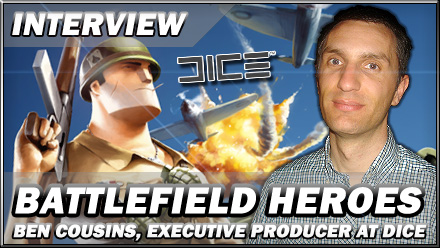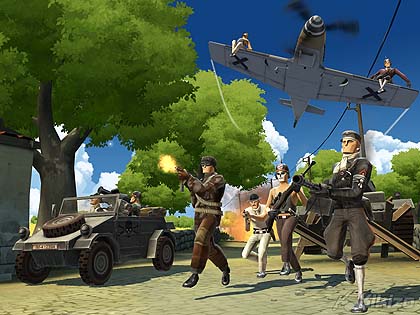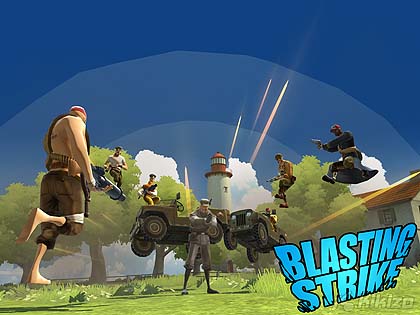DICE Battlefield: Heroes Interview
A Battlefield game with no upfront costs? Sign us up. We chat with DICE's Ben Cousins to see why Battlefield Heroes is far from a Team Fortress clone.

By Kikizo Staff
Imagine you're Ben Cousins, executive producer on EA's new Battlefield: Heroes game at DICE, in Stockholm, Sweden. You've got an interesting game built around a new business model that pushes shooters in a new direction. And all people want to talk about is why your game looks like Team Fortress 2.
To be fair, Cousins himself cops to the similarities in our interview, which took place at EA's recent PC gamers day in east London. But, says the affable creator, the similarities are only superficial.
Battlefield: Heroes is something new for DICE. It's a cartoon-style shooter that you can only play online and you don't need to pay a cent to do it. Rather the game is built around microtransactions, fees you'll (hopefully) gladly part with to make your character stand out or your experience more fulfilling.
To find out more about Heroes and what this business model means for other brands under the EA umbrella, we sat down with Cousins for a quarter of an hour. Following is a transcript of our interview.
Kikizo: I see we've got another Brit at DICE [see our upcoming interview with Battlefield Bad Company's Jamie Keen] and you're an executive producer as well, so you're quite senior. Could you tell me a bit about how that came about?
Ben Cousins: I've been in the industry for about eight years. When I was working in QA at Acclaim, when I started, I played a game named Codename: Eagle. I don't know if you remember that. It was kind of part of the Battlefield series, but it wasn't officially part of the Battlefield series. So I found out that this company is based in Sweden, so I thought, "Wow, that's cool," because I had a Swedish girlfriend at the time. So I had been with this Swedish girl for 13 years now and we'd been living in London for 12 years. And about a year ago we decided to move to Sweden and stay there for a bit, and I was like, "Well, I'll go work for DICE, because I'm a big fan of their games and it makes perfect sense." It all fitted together nicely.
Kikizo: Obviously the interesting point about this games is the play-for-free model, which is going to be supported by ads and micropayments. Which of these do you think is going to support the game the most?
Cousins: It's very difficult for us to know. We've got lots of models and projections. Obviously we've worked really carefully on this. Our feeling is that the majority of revenue is going to come from micro-items but of course we get advertising revenue from everyone who plays the game, but we only expect to get micro-items revenue from a very small proportion of people - approximately 5 per cent of the audience we expect to buy items. And we're perfectly happy, ecstatic, for 95 per cent of the people who play the game to never spend any money whatsoever.
Kikizo: What are your views on where in-game advertising is at?
Cousins: Well, in Heroes, we don't really have any in-fiction advertising. Advertising is on the website and in the menu, so it's a different sort of idea. I think there's a fantastic opportunity for in-game advertising which fits within the fictional world. So a driving game or a football game or something like Grand Theft Auto which takes place in the modern world, I think you can use advertising and brands to really enhance the experience. What I'd like to see in the future is advertising used tastefully. Like, James Bond's got to drive a car, so let's do a deal with Jaguar for his car, rather than, "Let's get as much money as we possibly can by putting advertising in the game."
Kikizo: But I'd imagine it's difficult. If you want to create an authentic Times Square, the onus is on you. You want to have the Coke logo, you want this and that. And half the time you're lucky if they permit you to use it. How do you get from that to, "We're not doing this for authenticity, we want some money off you for the privilege of putting it in there as well."
Cousins: I'm not the best guy to talk about this. That would come down to the [business development] guys who do all of the negotiations with the brands, but I think there's an opportunity for a kind of cooperative relationship between those brands and the game. You need them, they need you. It's an interesting area. I don't think we're quite there in terms of the model yet, but I think in the future it will become completely standard to have advertising in a game or brands in a game.








 Satoru Iwata Video Interview - the late Nintendo president spoke with Kikizo in 2004 as 'Nintendo Revolution' loomed.
Satoru Iwata Video Interview - the late Nintendo president spoke with Kikizo in 2004 as 'Nintendo Revolution' loomed. Kaz Hirai Video Interview - the first of Kikizo's interviews with the man who went on to become global head of Sony.
Kaz Hirai Video Interview - the first of Kikizo's interviews with the man who went on to become global head of Sony. Ed Fries Video Interview - one of Xbox's founders discusses an epic journey from Excel to Xbox.
Ed Fries Video Interview - one of Xbox's founders discusses an epic journey from Excel to Xbox. Yu Suzuki, the Kikizo Interview - we spend time with one of gaming's most revered creators.
Yu Suzuki, the Kikizo Interview - we spend time with one of gaming's most revered creators. Tetris - The Making of an Icon: Alexey Pajitnov and Henk Rogers reveal the fascinating story behind Tetris
Tetris - The Making of an Icon: Alexey Pajitnov and Henk Rogers reveal the fascinating story behind Tetris Rare founders, Chris and Tim Stamper - their only interview? Genuinely 'rare' sit down with founders of the legendary studio.
Rare founders, Chris and Tim Stamper - their only interview? Genuinely 'rare' sit down with founders of the legendary studio. The History of First-Person Shooters - a retrospective, from Maze War to Modern Warfare
The History of First-Person Shooters - a retrospective, from Maze War to Modern Warfare